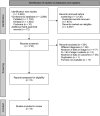Risk factors for recurrence in stage I colorectal cancer after curative resection: a systematic review and meta-analysis
- PMID: 39823035
- PMCID: PMC11735171
- DOI: 10.4174/astr.2025.108.1.39
Risk factors for recurrence in stage I colorectal cancer after curative resection: a systematic review and meta-analysis
Abstract
Purpose: Patients with stage I colorectal cancer (CRC) rarely experience recurrence after curative resection. Therefore, the risk factors for stage I CRC recurrence are yet to be established. We aimed to identify risk factors for stage I CRC recurrence.
Methods: MEDLINE, Embase, and Cochrane Library were searched for articles published between 1990 and 2022. The pooled proportions and hazard ratios (HRs) were calculated. Fixed- or random-effect models were considered based on heterogeneity, using Cochran's Q-statistic and the I2-test.
Results: Nine studies involving 19,440 patients were included. Nine analyzed risk factors were identified. T2 stage (pooled HR, 2.070; 95% confidence interval [CI], 1.758-2.438; P < 0.001; I2=0.0%), lymphovascular invasion (HR, 1.685; 95% CI, 1.420-1.999; P < 0.001; I2 = 0.0%), venous invasion (HR, 1.794; 95% CI, 1.515-2.125; P < 0.001; I2 = 0.0%), CEA level (HR, 1.472; 95% CI, 1.093-1.983; P = 0.011; I2 = 1.8%) and rectal cancer (HR, 2.981; 95% CI, 2.378-3.735; P < 0.001; I2 = 0.0%) were risk factors for the recurrence. However, the risk of recurrence in right-sided colon cancer was lower than in left-sided colon cancer. (HR, 0.712; 95% CI, 0.537-0.944; P = 0.018; I2 = 0.0%). No statistically significant differences were observed in the number of harvested lymph nodes, age, and sex.
Conclusion: T2 stage, lymphovascular invasion, venous invasion, CEA level, rectal cancer, and left-sided colon cancer were risk factors for recurrence in stage I CRC. Intensive monitoring and surveillance are warranted for patients with high-risk features of recurrence.
Keywords: Colorectal neoplasms; Recurrence; Risk factors; Systematic review.
Copyright © 2025, the Korean Surgical Society.
Conflict of interest statement
Conflict of Interest: No potential conflict of interest relevant to this article was reported.
Figures



References
-
- Arnold M, Sierra MS, Laversanne M, Soerjomataram I, Jemal A, Bray F. Global patterns and trends in colorectal cancer incidence and mortality. Gut. 2017;66:683–691. - PubMed
-
- Sung H, Ferlay J, Siegel RL, Laversanne M, Soerjomataram I, Jemal A, et al. Global cancer statistics 2020: GLOBOCAN estimates of incidence and mortality worldwide for 36 cancers in 185 countries. CA Cancer J Clin. 2021;71:209–249. - PubMed
-
- Pignone M, Rich M, Teutsch SM, Berg AO, Lohr KN. Screening for colorectal cancer in adults at average risk: a summary of the evidence for the U.S. Preventive Services Task Force. Ann Intern Med. 2002;137:132–141. - PubMed
-
- Gross CP, Andersen MS, Krumholz HM, McAvay GJ, Proctor D, Tinetti ME. Relation between Medicare screening reimbursement and stage at diagnosis for older patients with colon cancer. JAMA. 2006;296:2815–2822. - PubMed
-
- Mandel JS, Bond JH, Church TR, Snover DC, Bradley GM, Schuman LM, et al. Reducing mortality from colorectal cancer by screening for fecal occult blood. Minnesota Colon Cancer Control Study. N Engl J Med. 1993;328:1365–1371. - PubMed
LinkOut - more resources
Full Text Sources

